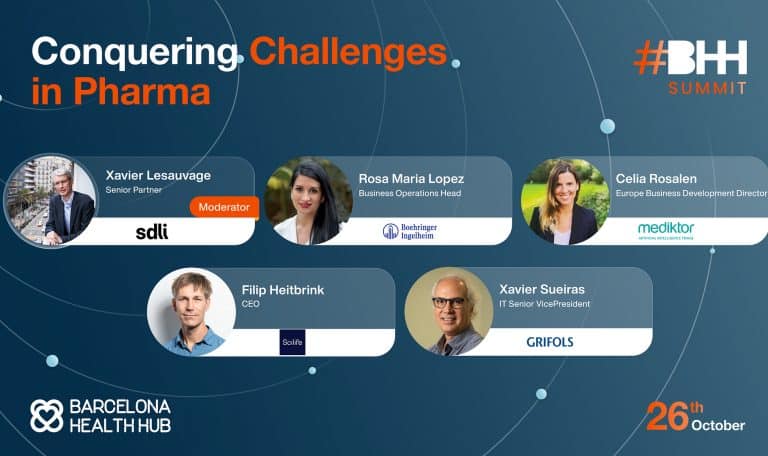In 2022 we had the pleasure of moderating the “Conquering Challenges in Pharma” panel at the BHH Summit to share perspectives on how digitization is unfolding and impacting the industry. It is evidence that Digital Health is growing in the pharma industry and with the arrival of new technologies comes new challenges as well. At this panel we learned how corporate & startups can contribute to conquer those challenges and explore their successful use cases.
In recent years, we have been talking a lot about digital health from different perspectives. At the BHH Summit panel, we took the opportunity to understand how pharma companies and start-ups are managing and living this transformation.
To bring some light and inspiration on the subject, we had the chance to count with four great experts on the field:

Xavier Sueiras, Grifols Information Technologies Senior Vice-President. Xavier is IT Global responsible helping Grifols to achieve its strategic goals and leading digital innovation initiatives. Grifols is the leading pharmaceutical company specialized in essential plasma-derived medicines.
Rosa María López-Carneros, Business Operations Head at Boehringer-Ingelheim. Rosa María is leading the digital development at BI Operations. Boehringer-Ingelheim is a leading research-driven biopharmaceutical company working on breakthrough therapies to transform lives.
Celia Rosalén, Business Development Europe at Mediktor. Celia is responsible for the development of Mediktor in the European markets. Mediktor is the most accurate AI-based medical assistant for triage and pre-diagnosis.
Filip Heitbrink, Co-Founder & CEO of Scilife. Filip is leading the development of Scilife and its partnering with the industry. Scilife is a star-up helping Life Sciences companies manage their quality processes and instil a quality culture throughout the whole organization.
And Xavier Lesauvage, Senior Partner SDLI, as moderator. SDLI is an innovation agency specialised in life sciences established at the BHH.
During the session we disused about which are the key initiatives panel companies are undertaking in digital health, which are maim challenges they face, the role of ecosystems in digital health and how the future looks like.

Initiatives and challenges companies are facing to develop Digital Health
All participants agreed that digitalization was the topic of the day and is something that started some 10 years ago, and it never stops.
As Xavier explained, digital transformation impacts different areas of company activities, regarding:
- How to improve customer and patient engagement as well as to improve add value and experience of the main stakeholders
- How can we extract value from data, basically in the R&D area willing to find new therapies and solutions for the sector
- How to use data to improve decision taking
- Also, how to improve efficiencies
Rosa Maria pointed out that a key peace in DT is how to engage and work with employees to deploy transformation efforts throughout the organization.
The way a patient behaves with health have changed a lot, especially since Covid19. One of the main changes in the patient’s pathway is how he or she behaves when feeling the initial symptoms, and here the Internet in general, and now telemedicine, play a relevant role, as Celia pointed out. This also helps in earlier and better diagnosis of the patient.
An interesting point is that digitization is not just taking the physical world, such as paper, to digital, but adding a step further. Adding some additional benefits, such as digital quality systems that allow to manage the quality process and its implication to turn it into a competitive advantage for the company, as Filip explained.
All this implies to work with different technologies such as AI, robotics, advance analytics and blockchain among others.
During the panel participants also shared their main challenges regarding the digitalization process, such as:
- Identify DT projects able to really have impact into the business adding value to the patient and physician, avoiding “firework initiatives”,
- Difficult to find the right partner, even if its part of the experimentation journey, assessing lots of partners to really find the one able to bring the right solution,
- Find the right match between the start-up’s capabilities and the company’s needs, as sometimes the initial partner, ideal for the pilot phase, is not the right one for the scaling of the same project, leading to multiple integrations and bringing complexity to the development,
- At the scaling phase, managing collaboration between partners and start-ups become crucial to ensure its success, and this require efforts which sometime are not obvious beforehand,
- Establish the right link between the pilot team and the scale team to ensure alignment and transfer all relevant knowledge and nuances for project success by connecting the teams and investing time.
- Regulatory framework adapted to suport develoments, and to generate a safe space to operate within the rules allowing experimentation
- Building the right “culture of transformation” to develop these projects is a long-term area that needs to be properly managed with a high impact on projects even though it may not be obvious.
- Providing teams with sufficient clarity on what the benefit of the project is and leaving room for experimentation helps to avoid “risk adversity” and understand the scope of a transformation
The role of ecosystems in Digital Health
As we have seen, there are a lot of internal, and specially, external partners playing a role in the development of a digital project, therefore, properly managing ecosystem is a crucial part of the DT. How can we do it to obtain desired objectives?
- First, the company needs to be aware of its relevance, spend time to identify the right partners (HCP, hospitals, patients, universities, research-centres, start-ups…) and find best practices to properly manage such and extensive network
- Develop a systematic approach to open innovation to make sure challenges are identified and the process and expectations are clear to all participants
- Proactively involve partners able to add know-how and find ways to combine their capabilities
- Evolve from ecosystems to communities, finding spaces to share challenges and knowledge with ecosystem partners on an ongoing basis.
- It is also important to involve internal staff in ecosystems, creating communities that allow different people in the organization to connect with other stakeholders working on the same topic, e.g. e-health.
The future of Digital Health development
Digitalization will take place in all areas of the healthcare process and should allow to reach better patient centricity and higher health effectiveness.
Digital health is an area of growth within life sciences sector, and it will reach higher relevance in coming years, according to panel participants. Its deployment will specially be relevant in areas such as:
- In general, to improve the quality of processes and go paperless in healthcare and patient relations.
- Beyond the pill to improve treatment effectiveness and adherence
- Health prevention of consumer and patients to improve their habits and health conditions
- Personalized medicine, able to deliver personal solutions according to specific patient needs
We conclude with the idea that “Digital is innovation”. Digital is the new dimension of innovation nowadays and will enable companies to offer more innovative and effective healthcare products and solutions.
You can watch the full BHH Summit panel discussion and get more details at this video in Youtube.
If you are interested about health and digital areas, you can read other relevant contents from our blog at Sociedad de la Innovación.




